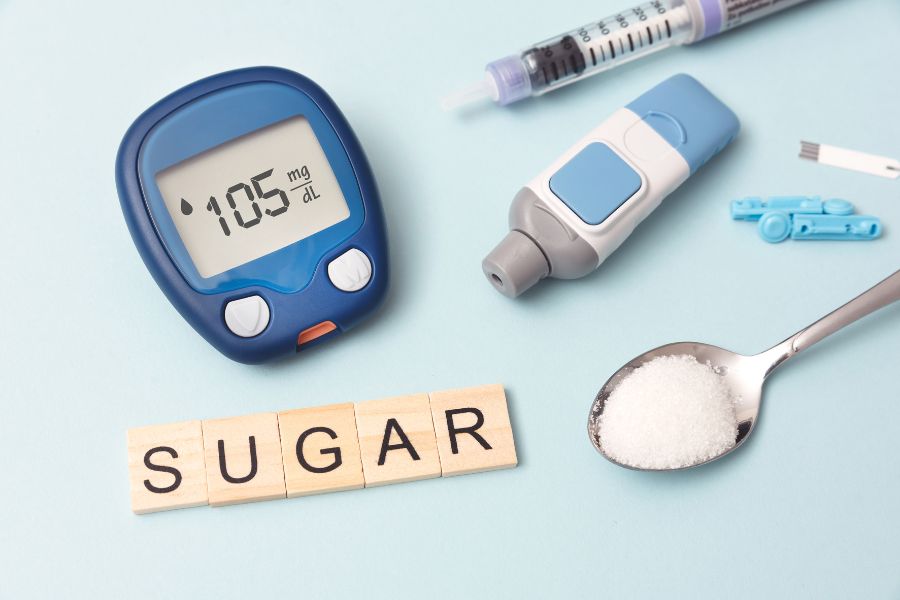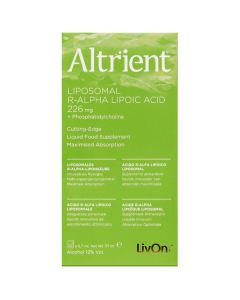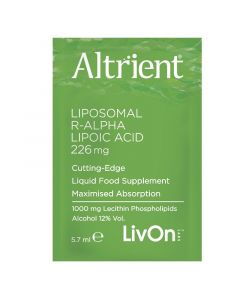
Alpha-Lipoic Acid for Diabetes
Alpha Lipoic Acid (ALA) is a powerful antioxidant compound, meaning that is plays a key role in neutralising harmful free radicals, helping to prevent cellular damage and reduce the risk of various chronic diseases such as diabetes
ALA is often referred to as a "universal antioxidant" because it is both water and fat-soluble, allowing it to be involved in a range of antioxidant processes throughout the body.

The difference between Alpha-Lipoic Acid and R-Alpha Lipoic Acid:
The chemical structures of R-Alpha Lipoic Acid (R-ALA) and Alpha-Lipoic Acid (ALA) is what makes them different as it impacts their bioavailability.
When a supplement is highly bioavailable, the body recognises it as a natural substance and a higher proportion of it enters the bloodstream when introduced to the body.
ALA is a combination of R-ALA with S-Alpha Lipoic Acid (S-ALA), generally at a 50/50 ratio in a supplement.
R-ALA is the pure, biologically active form of ALA which is believed to be more effective in the body due to its bioavailability. Whereas S-ALA is generally considered less biologically active than R-ALA.
Therefore, R-ALA supplements are the best form of ALA to search for as they are better absorbed and utilised by the body, ensuring that a greater percentage of the active ingredients reach their target tissues for enhanced health benefits.
What Does R-Alpha Lipoic Acid Do For Diabetics?
There are numerous studies and clinical trials that have tested the effectiveness of ALA of a range of diabetic factors. Here are the most researched, and thus, most reliable benefits to expect when taking ALA for diabetes, especially if taking the natural form R-ALA:
Insulin Resistance:
The antioxidant power of alpha lipoic acid supports energy production within the cells and this process has been closely linked to insulin sensitivity. People with both type 1 and type 2 diabetes are prone to becoming insulin resistant. Insulin is a hormone produced by the pancreas, playing a key role in regulating blood sugar levels and allowing our bodies to use glucose (a type of sugar) and convert it into energy.
As diabetics are prone to becoming insulin resistant, the body struggles to convert glucose into energy. This leads to the common indicators of diabetes such as high blood sugar levels, frequent feeling of hunger, and weight gain, particularly in the abdominal area. Multiple research studies have found that ALA can significantly impact glucose metabolism, highlighting it's positive effects on insulin resistance. It has also shown to improve insulin sensitivity in other conditions such as polycystic ovary syndrome (PCOS).
Diabetic Neuropathy:
Diabetic neuropathy is the most common form of nerve damage linked to diabetes, resulting in symptoms such as numbness, tingling, or pain, typically starting in the feet or legs. This form of nerve damage is a caused by hyperglycaemia (high blood sugar levels), which over time can damage nerves and blood vessels, affecting the nervous system and impairing its ability to function properly.
Systematic reviews show that alpha-lipoic acid may help to lower blood sugar levels and insulin resistance in diabetic patients. Patients taking 600mg of ALA orally per day showed improved scores in both diabetic symptoms and neuropathy impairment after 3 weeks.
How much ALA should a diabetic take?
Clinical trials recommend a dosage of 300-600mg daily. We recommend taking the r-alpha lipoic acid (R-ALA) form for maximum effectiveness.
Conclusion
Multiple trails show that alpha lipoic acid (ALA) has positive effects on patients with diabetes, specifically in relation to glucose metabolism, insulin sensitivity, and diabetic neuropathy, due to its powerful antioxidant power.
However, more research needs to be done on whether alpha-lipoic acid is an effective long-term diabetes solution with better understanding on potential side effects, and whether it is suitable treatment for all individuals with diabetes.
What's the best alpha lipoic acid?
We recommend taking Altrient r-alpha lipoic acid for two key reasons: bioavailability and absorption. Its superior bioavailability and absorption is documented due to its advanced liposomal technology, ensuring efficient delivery of this powerful antioxidant to cells. The liposomal encapsulation enhances stability and absorption, maximising the potential impact of R-alpha lipoic acid on cellular energy production and overall antioxidant support.
References:
- https://pubmed.ncbi.nlm.nih.gov/18571145/
- R- Is Superior to S-Form of α-Lipoic Acid in Anti-Inflammatory and Antioxidant Effects in Laying Hens - PMC (nih.gov)
- https://diabetes.org/health-wellness/insulin-resistance
- Alpha-Lipoic Acid and Glucose Metabolism: A Comprehensive Update on Biochemical and Therapeutic Features - PMC (nih.gov)
- Modulatory effects of alpha-lipoic acid (ALA) administration on insulin sensitivity in obese PCOS patients - PubMed (nih.gov)
- https://www.ncbi.nlm.nih.gov/pmc/articles/PMC4008011/
- https://www.ncbi.nlm.nih.gov/pmc/articles/PMC9824456/
- https://pubmed.ncbi.nlm.nih.gov/20421656/
By Rhysa Phommachanh BA (hons) Specialist Hair and Media Make Up








